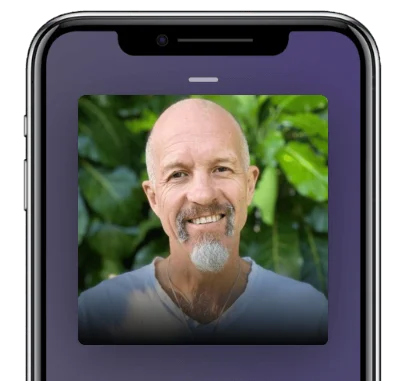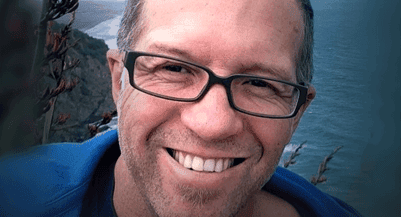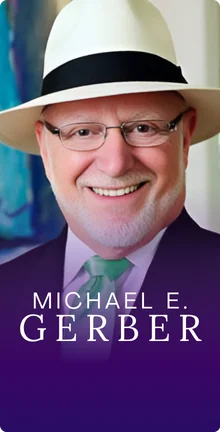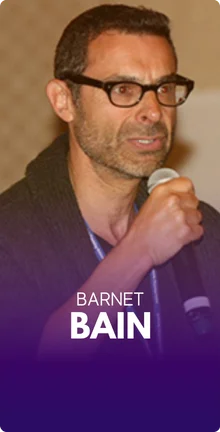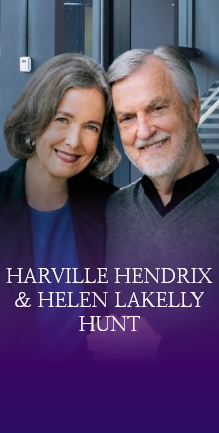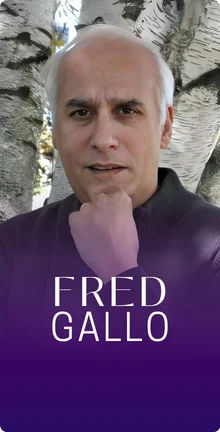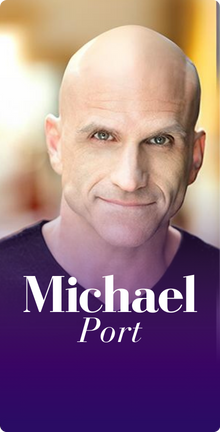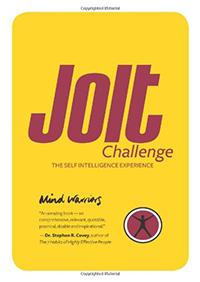
Welcome, Steve, it’s great to have you on the show!
Wow! Thanks, Stephan! It’s a real pleasure to be here, and to face-to-face with you digitally. It has been a while since we have spoken. I have been sort of following your little pathway there, which has really intrigued me, and all the inspiration that you are bringing to people around the rise of the geeks above and beyond what we normally see. That’s been really fun in a lot of ways too, and it’s nice to bring that sort of fun, I believe, in to the world. We get a bit of serious in life often.
Yeah, I think being a geek is an awesome thing, and the idea of optimizing your energy so that you bring your best self forward, and you’re not just a shrinking violet, you’re not socially awkward, or you’re just not good on stage speaking or whatever, but you’ve really developed yourself across the board. You’re well-rounded and, essentially, done a reboot. I mean, that’s what I’ve done in my life, and I want everybody to the same so I’ve seen you really evolved too. I mean, you’ve gone from this area of just geeky web development and design, being world-class at it, but then, just saying, “Well, I want to change people’s lives, and not just help them with some animated flash thing or whatever, but I want to have a lifelong impact on people,” and that’s what you’ve been doing. It’s inspirational. Let’s talk about self-intelligence. What the heck is that?
Well, if I go back a little bit just to clarify, it’s actually been 19 years-I think it was 1998-that we met up. Self-intelligence is something that originated from doing work in corporates, but also from my experience as you mentioned earlier, all sort of elements in different areas. In some ways, it was coming out of the closet and into the forefront to bring in that type of work that I hadn’t been doing commercially, you might say, into that area, and going from like being involved with media, and then having the background working, and why is an element during different programs. This is even back in the ’80s almost into this sort of area. You realize that you couldn’t speak to too many people about it because people would either think you were fluffy or you weren’t taking life so seriously if you’re into those soft-skill areas.

As it happened, and I suppose the wheel evolved, those sorts of things became more and more commercial, and people like Tony Robbins who are really helping to spread it more on a mass basis. We started getting involved. A friend of mine, Wade Jackson, and I finished up with media, and we got involved with improv, and helping him with his improv theater. From there, we were-I did improv as well. For everyone who doesn’t know improvisation, it’s like Whose Line Is It Anyway? I’m sure in America, most people know Whose Line Is It. He was approached by a corporate, “Can you do some of your stuff in our work?” and while I was helping with his theatre, I started to learn and associate it.
We started to look at the exercises and how the exercises that improvise used to be spontaneous on stage, supporting a fellow team player-that whole creative aspect in storytelling, which was the style of improv that he was doing. We looked at the exercises, and we started to bring some of those to create programs. The exercises we found really reflected human behavior so if you have, again, the monopoly, and maybe you’re winning or losing, you start to see human behavior start to come out with some people out of the things run away or whatever.
I was a very bad sport as a kid. If I lost at badminton, I have a little temper tantrum.
Yeah, so the self-intelligence space came from the evolution of the programs we were creating there that are mainly around creating activity and storytelling. We started to see think as we were working with corporates, “Why are so many people unhappy in here? Why are they stressed and struggling?” It just wasn’t a real healthy, thriving environment. We decided back in 2004, I think it was, that we should create a different type of program, and rather than focus on creativity and storytelling, we can marry some of that stuff into what we’re doing, but actually focus on the “self” aspect, which I’ve been a part of a lot of my life anyway.
When I look at people in general, Stephan, it’s really interesting. A lot of us spend most of our time outside of ourselves, helping other people, doing things from the people, getting influenced by other people, and it’s all outside. Now, some of the stuff we take inside, but we don’t acknowledge what’s happening inside because our focus isn’t in there and how we think and how our emotions are. I even remember when we were first putting Jolt together, we were doing some test group and setting out exercises to people to try and see what it’s like. I sent it out to a friend of mine who actually worked for me at WebMedia. She said, “Oh, gosh, I don’t want to know anything about myself! I’m sorry I can’t do this for you!”
I was a bit taken aback by that because, you don’t realize that other people-we, then-I suppose, government’s duty to create this program around self-intelligence, and why self-intelligence? Because Daniel Goleman came up with emotional intelligence, and that really became more prolific in a, I suppose, corporate environment. He wrote the book, Emotional Intelligence, even if it wasn’t all that stuff, but he brought it to the forefront as well. What was self-intelligence was? Self-intelligence is the ability to, initially, just acknowledge that you have this inner self that you can access and get information from that is beyond, “What do I have for dinner tonight?” and to know that the answers that we have to our deepest questions are actually inside us.
We just need to take the time and make the space to be able to do that. Once we have that ability to acknowledge that, we know that we have self-awareness, okay? Self-awareness is the foundation of self-intelligence. From the self-awareness, we are aware of our thoughts, emotions, behaviors, and our capabilities. We become aware of that, but just by being aware is not enough, right? We have an experience. How do we decode that experience? Initially, we have the experience and we go, “Right, but what happened there?” Okay, how was I in that experience? So, we reflect on the experience. Our self-awareness comes from that reflection. It can be while it’s happening if we’re lucky sometimes and not having an emotional hijack, but if we are acknowledging it, we reflect and we take that time to reflect, “What happened with this interview with Stephan? Where did it go wrong?”
Fantastic-whatever it was so I reflect either as I’m doing it because I’m more advanced or if I’m not, I can actually do it later and then work on that. Then I go, “What do I need then to improve upon with that? What are the tools that I need to bring in to manage that?” Basically, self-awareness, reflection, and self-management and bring that all in try that whole or exercise to improve myself to give me that repeated cycle to improve and improve as we go. This is kind of basic idea about self-intelligence.

Right. Got it! I’m thinking of different modalities that allow you to do that self-reflection and kind of re-experiencing, let’s say, it was a trauma event or something that you took really personally, and it wasn’t meant personally-like CBT or Cognitive Behavioral Therapy, where you re-experience it again. You take the activating event and you re-evaluate it under new-like a new perspective.
Yeah.
And that can work really well for some people. Some are closed off to it, and it doesn’t work, but there are multiple modalities-CBT, being one of them. What would be some of your favorite ways of re-evaluating an experience to make it more kind of objective and less emotionally-charged or negative?
Well, CBT is a great one. EFT is another one or Emotional Freedom Technique.
Yeah.
We’ve had, as an exercise that we teach people how to use it. Oligemic Training is another one. Sorry, EFT is the, if people don’t know, is using an affirmation and tapping on different points on your head so we cover that sort of thing, and it’s a way to change the feeling that underlies the experience that you’ve had that has created a bit of trauma or that issue that you have. Even because there’s a lot of emotion behind those things.
Yeah. That’s such a powerful modality. I love EFT. It’s also known as tapping. I used it to really reduce my fear of the water and fear of heights. I was able to go kayaking for the first time in my life on the Zambezi River in Africa, where it was really quite dangerous. There were hippos and crocodiles. You definitely don’t want to fall in. That was my first time kayaking ever, and it was directly because of an EFT experience where I was worked on by an EFT expert. A guy named Fred Gallo, who is actually going to be interviewed on the show in the next few weeks. We’ll go deep-dive into EFT in that episode. I mean, that guy really had a profound impact on me. Forty-five minutes, that’s it. One 45-minute session in Africa, in Zambia, allowed me to go shark-diving. It allowed me to do all these amazing things that I would have been terrified to do in the past, and it stuck. I was able to go jet-skiing three months later and inner-tubing and stuff. Pretty cool stuff! I’m a big fan! Yeah.
And EFT and all these three-lettered acronyms-PET, CBT-they all exist and can all be very beneficial. I think from my real self EFT-if you can get someone to use it, it can be very beneficial. Other things just in the sense of taking time out, and what happens, experiences too. I mean, it’s already like these neurons that are firing up in a lot of place from the experience, but we tend to create these loops of remembering the experience. Every time you get to situation that might trigger it, you go do this kind of remembering again, and it might be putting you into an unresolved of state where you’re not maybe as communicative, or maybe you’ve gone to depression so it’s acknowledging that.
Right, because these patterns turn into ruts, and these ruts turn into graves, and you just can’t dig yourself out of.
The most important things are usually about you and what’s important to you.
Yeah, and the trouble is, and as a sign of a moment, we don’t take the time to do that. “Oh no, I’ve got work!” “I’ve got to do this,” “I’ve got the kids,” or “I’ve got-“whatever it is, we make these excuses to hide away from it. This is what I’m saying earlier-we’re always looking outside of ourselves for these answers to solve our problems, but actually, if we take that time, and whether it’s just sitting down, meditating, having an intention that you want to clear something, meditating on that intention, and journaling afterwards of whatever might be of what happened that I find more and more, through meditation, it helps to still, and the thing that I need to know, for me, start to enter into my mind that are important like “Oh, right. I should be doing that!” or “Yeah, that’s right!” With all the trials happening in the world, those important things kind of get left aside. The most important things are usually about you and what’s important to you.
Yeah, they’re not necessarily urgent, and so we don’t address them even though they’re important to our life’s mission or to our purpose of even being on this planet.
That’s right. It’s like pay attention to the small things before they become big things. What we say is that, people don’t pay attention to these things. They go through life and they’re stressed, stressed, stressed, and being all of a sudden, “Oh my God, the doctor has just given me a diagnosis of cancer,” or whatever it may be. What we’re finding is that, a lot of people are having these life-changing experiences, and one reason is, it’s not a one-day/two-day program. Next disadvantage for us in some ways, but an advantage for people, we may actually engage with it. A disadvantage. In a corporate environment, people would be, “Oh no, we don’t have time for that.” Well, you don’t not have time for it, basically, because if you want to have a thriving organization, a business where people are actually enjoying that you have helped to create through idea of self-intelligent culture, perhaps, then, you’re wasting your time. You’re going to have people stressed. You’re going to have people high turnover. There’s a lot of advantages that we’ve seen from working with businesses. We talked about thriving. Thriving is kind of beyond engagement. At the moment in the world, there is an engagement and organizations from Gallup Poll. I think it was around 18% or I’d put it up around 25% more, but that’s pretty bad-25% engagement in companies.
Yeah. That means, essentially, 75 or 85%, and I’ve seen this research too, actively disengage employees.
Yeah.
They are just punching the time card. There’s no real care or engagement in the success of the business. They’re essentially renting their jobs, instead of owning their jobs-just like you’d rent a car, instead of you’d own a car, you treat them completely differently.
Yeah, you would. That’s right. Well, what’s the underlying issue usually in corporate environments, and we feel that at the very foundational, it’s vulnerability. People now are willing to show their vulnerability within the organization because we still come the industrial age and the patriarchal society still rules. We don’t show our emotions. We don’t show how vulnerable we are in these situations. We don’t know enough of things. By helping people to understand themselves more, gives them more confidence in themselves to feel like they’re in an environment with others if the can be more vulnerable and therefore, from that vulnerability builds trust. Because now, we can trust each other. From the trust-and people who go through the program-we have different ones-but the main challenge, they really mean to socialize more and telling stories in the program and they build that trust. From the trust, we then have open communication. The open communication is really important if we want to be collaborative more in business, which is another huge problem. Lots of things that happen in business. The collaboration improves, and then from collaboration, we start to get more creativity because people are working together. They can go, “I have this idea,” and “Oh yeah, let’s work with that!” Then, from creativity, you get more commercial success, and then you are able to get towards your vision more with everyone on the bond-everyone on board.
Yup.
So, ultimately, your business thrives.
Yup.
By helping people to understand themselves more, gives them more confidence in themselves.
This kind of a triangle that we see, starting from the bottom-the vulnerability going right through the thriving, and we are a part of that. We are all of that, but really start-you start with the mind of the individual, basically. And how can we help him to be balanced in their thinking, their emotions, and their behaviors. The areas, too-we work with this health-wealth relationships. We talk a lot about that within the program. Health, for me, is a big one. As you know, my wife died of breast cancer back in 2007 so that was quite a big thing. She was like a soulmate to me. We have two boys who are four and six at the time so, I’ve seen her go from being diagnosed in 2002, which was a real shock to us both-I’m sorry, 2003-to her withering away and dying of starvation, basically, in cancer. It was a really emotional journey for me, but one I do not find-I hate to say it, but really, really challenging-and I’ve put it down to a lot of work that I’ve done on myself. And to have that acceptance and to understand that things just are-as they are.
Yeah, because you can’t let it destroy you. You have two kids that you have to raise. She wouldn’t have wanted that to cripple your ability to be in the world, be a parent, and everything so you’re able to apply all the self-developments stuff that you’ve been working on yourself so you could step up in that time of extreme stress and-
Yeah, that’s right. Through having that experiences myself, I see the value of understanding self. Other people, when they’re going through those traumatic times, whether it’s at work or they’ve got something going on at home that’s traumatic-I mean, where can life-they’re probably the same thing. It’s an integration thing. If you have problems at home, it’s going to come to work. If you have problems at work, it’s going to get at home. By having the right ways of thinking, the right tools that you can, and experiences that have helped you to be better at being you makes so much of a difference to how you deal with situations like that.
Yeah. Let’s talk about creativity because that’s one of the parts of this equation here. Fostering creativity requires vulnerability, and it requires being accepting of other people’s opinions, being able to bounce ideas of others around, and so forth. You learned improv in the course of working through this training and developing your system. Improv-I don’t know a lot about, but my understanding is, basically, yes, and you just you don’t squash somebody else’s idea, you just build on it, and it just goes and has a life of its own-start somewhere and it just turns into something really crazy, fun, and funny. It’s all very spontaneous. One thing that struck me about the New Zealand culture was how innovative it was. Now, one person had told me-and this distinction and really stuck with me-is that New Zealanders were not really inventors, per se, they were more improvisers, right? So, they would improvise. They would create something like number eight wire because they could not get the other forms of wire in the country because of the tariffs and the taxes so they had to figure out a workaround-
Yes.
And they would use number eight wire for everything. They would improvise because that’s the only kind of wire that was available. That was the only type of wire that was made in the country, and everything else had too many import duties on it, and are just too expensive to use so-what I found was, the innovation culture of New Zealand was a breath of fresh air. I was able to really reinvigorate my business that was a US-based business by having a whole team of people in New Zealand doing design development, consulting, systems administration, and stuff from New Zealand for our US-based clients. I was able to hire top-notch talent in comparison to what I would’ve had in the US. It was just a night and day difference so for me, it worked, and whether you call it improvisation or you call it invention didn’t matter to me-it was an early adopter country that was just always into the next new thing and doing such cool stuff. It was a breath of fresh air so, how do you reinvigorate a business that is kind of stagnant and doesn’t have the innovation culture to it-whether it’s small, big, or medium-size, it doesn’t matter-what’s the process other than, of course, sending them to the nine-week JOLT challenge, which they should do anyways?
Yeah, okay. Well, that’s a good question. First thing, duct tape is the new number eight wire.
Yes.
It’s not the vision, it’s the purpose.
Works for all sorts of, yeah. Okay, how do I get to that? Like I said, the part that we have to play is, initially, understanding the business and the needs of the business. One word that I mentioned earlier, and it seems to be coming out more and more now, is around purpose in business. It’s not the vision, it’s the purpose. Why are we here doing what we’re doing? Because life’s purpose gives meaning.
Okay.
I think if we are not true to-when a company doesn’t have that-the purpose of vision-none of this other stuff is really going to work anyway and more so, it’s having to start with a top label, and how is that-I wouldn’t say enforced, but how is that managed that we stay on that path and on that track? I mean, the number of companies that I have seen that will say, “Yeah, we’re staying for this,” but they don’t so, they have an external brand promise, but what’s happening internally is something that’s completely different. From a creativity perspective and being more creative, I still would go to the top of the triangle, which is the purpose and the vision and because that helps to create the foundations for what will drive people to that culture. Yeah?
Hmm. Yeah, I love that!
That’s what we’re promoting, right? Whether it’s in recruitment or whatever it might be. When they come into the business-and like you talked about before-brainstorming-there are always different things that happen in the business that, at these modern times, and what we’re seeing from what things used to be, is that, companies want to be more agile, innovative, and creative now. They want to be able to move fast. They want to be able to make the decisions faster, and do some failing along the way. In the past, failing was frowned upon, right? But it’s an essential part of creativity as we know. But how fast can we fail and learn from those mistakes and move on? The old systems and processors that we have bought or have existing from the industrial kind of phase of business has slowly reaching out and a lot more as you know in the smaller companies. The bigger companies are still struggling a little bit with that. Over of process and trying to get things done takes six months. Recently, when one of our Telco’s here-for me, just to get the domain name key has taken a month through the air and things like that. I mean, that shouldn’t happen like that. Even though, they’re trying to do to keep up with everything-anyway, where I’ll get back to is that, to get to that creativity, it is a lot about changing mindsets. There’s no doubt. That’s just the last-no matter what tools, things, processors, and what the environment’s like, it’s the mindset of the people.
Yeah. Because people have, oftentimes, a very fixed way of thinking, and that limits your creativity. It limits your perspective. Your ability to adapt.
That’s right.
And your happiness.
Yeah.
Your fulfillment.
It does come from the top. No matter what people say, if you’ve got a leader who nurtures that within the business, the business is going to be like that. I remember a story of my sister-in-law who works on most weekends in the big corporates in UK consulting, and she said that one company she was working at, they had a change of CEO while she was there so the first CEO that was-then everyone else would be in their suits and ties, the middle management and senior execs, and he’s like sort of occasionally dressed, wearing his new suit, and then the reason the staff to follow that. It would have worked vise-versa as well so, what happens at the top reflects down the chain.
Yeah.
If you want your company to be creative, it just can’t sit at the top.
Now, not always though. This is another interesting point. It’s that-if you want your company to be creative too, it just can’t sit at the top. People and businesses and it’s a bit of an ego thing sometimes. The leaders on these programs and we’ve seen this much money on training, but what about the rest of the people? What about the people who are at the front-end. What piece of development or what sort of soft-skill training they’re making? They are the ones who are facing the client. They’re the ones who are giving the customer the experience that is going to make that customer come back to choose him over someone else so very little money gets spent on them, but they say, “Oh, well, at the top, it will filter down.” The trouble with that is, a lot of these managers are so busy trying to manage and do their own stuff, but then they don’t get time to pass on those skills so much directly-it’s more underrated so the filter down isn’t that great. And these are some of the things that we’re saying in the companies that we work with. There needs to be a different way of thinking, and that filter down effect needs to work differently as far as trying to create more self-managing teams. That way, the manager or the exec or whoever it is, will have more time supporting the team that they have rather than telling them what to do, which is another mindset shift.
Right, but how do get the balance right when on one end of the spectrum, you have this thing called holacracy, right? It’s kind of a free-for-all and Zappos is in the midst of implementing it. I think it’s a terrible idea-like, to remove all titles, all hierarchy. There are no managers. There are no executives. It’s all very fluid and everything, but I’ve seen so many people leave the company because of that. I just think it’s a terrible idea so I don’t spouse that sort of approach, but then you get these very hierarchical rigid organizations that are not able to adapt to the times.
Yeah.
So, what’s the right mix?
I mean, you might know that it’s easier to bring or recruit people into a situation that exists than to change the situation while they’re in for them. If you already have an organization that’s set up and that is running like that, when people come in, they know what to expect and they know how it works. If, for example, you have 5,000 people and all of a sudden they say, “We’re going to change this to holacracy, you’re going to get people leaving otherwise. Because they’re going to feel, “This is disorganized. I can’t get things done now,” because the transition of that is so taxing for people. For me, I wouldn’t look at doing the whole of the business like that. I’d say, well, let’s look at what segment of the business we should look at using this one first? And mix trial that and see if it’s going to work for us. Maybe it’s a project-based kind of thing or whatever it might be. Maybe it’s not part of the business. You start to bring them slowly into the business, yeah?
Yup.
I can remember with WebMedia, we used to, we’d have IT over here, suddenly you’ll have marketing over here, a mix between senior execs and management, right? We didn’t want to do that so we thought we’ll instead have individuals from each part of the business-like design, technology, project management. That will all be sitting together so that we’re working on the similar projects, right? These different sale teams. But what we would do is, then, we would change the positioning-maybe in six months-then get somewhere else, and then we’ll receive it based on who do I want to learn something off now-or it might be, “Let’s set up a project team with the best people who are suited for that team,” and then who can we be training from there. Some of them highly do it for two weeks, right? But after a while, they started to see the value and actually changing the environment and learning things from different people. That was easy because we were smaller, you see. But in a big company, I can understand why people would be leaving like in Zappos, yeah.
Yeah. You mentioned vulnerability being kind of an underpinning for taking a business or any kind of an organization to the next level, and you can’t grow a business effectively without vulnerability so, how do encourage vulnerability? What does vulnerability look like inside of a big corporate environment?
Well, from the top, years ago, when we were doing storytelling creativity, right? Part of storytelling we would bring into presentation so, weworked with senior executives of one the banks here in New Zealand, and part of what we would do that we’ll get into bringing a presentation, and they’ll be talking away going to the presentation, because the PowerPoint would be up. Then, what we do is, because we would bring in like an audience that would be from within the business, right? That be listening to it, and then we go, “Okay, now, put that aside-“whatever it was, and we want you to now, tell us a story. Tell us a story about something that you’re really into. Something you’re really passionate about so, anyone that do that, we’ll experience, and some of the stories, since they told them, some of the vulnerability came out. Now, what happens is, there’s a big shift in light that audience from within the business, right? They’re sitting there and listening and afterwards, we go, “Wow, why didn’t I know that about him? That just really changed the way I think about him as a leader.” What it does is, it created connection between those two people. Between the person who is listening to them-actually, talking about themselves as a human-
Right.
Not as a corporate-they were talking to them-it’s humanity. It’s bringing humanity back in the work place. “I’ve got some problems at home, can I talk to you about it?” “Yeah, yeah, okay. If that helps you, yeah.” Do you know what I mean?
Right.
Give us a place for humanity in the work place is what I’m saying. How do we do that? It’s through giving people the confidence that they know it’s okay. We had one time-another example-we’re doing a session with a power company here, and my business partner, Wade, said, “Look, can we just get the CEO to hold this lightsaber,” because we’re doing a little skit, and the HR-I think it was the HR-so I was like, “Oh no, who would do that?” Anyway, it came to the day when we did it, and Wade, just before him, said, “Oh, here. Why don’t you use this?” He’s like, “Oh, great! You know, the kids got one of this at home!” so the CEO had no problem at all with doing it, but these boundaries, these kind of barriers that get put up in people’s minds that assumes. Because of the hierarchy, because of the ego, and all sorts of things that go on a business.
Give us a place for humanity in the work place. It’s through giving people the confidence that they know it’s okay. Share on XYeah. There are so many stories that we make up that are not even true. I am huge proponent of opening up, being vulnerable, sharing your personal life-to a degree.
Oh, yeah.
You don’t want to-oversharing is not necessarily a good thing, but for example, I was on TV. I had seven TV appearances in the last three months, and two of them, I talked about being a foster kid as a teenager. I don’t think anybody knew that I was a foster kid. That was a surprise. Not only did I survive, it really changed the nature of some of my business relationships. They had new levels of respect for me and admiration because here, I’m not just trying to get my company on TV, get leads, and so forth. No, I’m trying to make a difference in the world. Those TV appearances were not about me getting you to visit some website or getting my funnel or whatever. It was just, “Hey, I want to make a difference, and if you’re inspired by my story and you want to help a foster kid out, here are a few different ways that you could do that,” And that was really well-received. It’s an evolution. A year ago, I probably would not have even thought of that-to publicly talk about being a foster kid, but I just-last month was National Foster Care Month. I put a blog post out, I did two TV appearances, and I think it helped some kids out there. I don’t know to what degree. I think that it started something. It, hopefully, had an impact so, I would encourage everybody to get outside your comfort zone, just try and open up, and be vulnerable. It’s not going to kill you! It’s actually going to do a lot of good.
That’s right. Be who you are. We have three big fears: fear of the unknown, fear of judgment, and fear of failure. I think what we’re all looking at here is the fear of judgment and the unknown-you don’t know what people are going to say when you do it. Then, you’ll think, “What are they going to say?” There’s a couple of things there. One of the things that-a good friend of mine, recently few months back, we were talking and she said one of the learnings she had, and it stuck with me for quite a while is that, what we want to do is keep the situations. When we see someone, like we have reconnected again, that we see them like you are meeting them for the first time, right? So, there’s no kind of pre-judgment of who they were or what they did before, but they are there now. We are here now. We are talking, and what is coming out is from our heart and not from our head.
Right.
And that’s so important because we’re not judging each other. We might get a laugh together or whatever might be, but we are here now, talking about the now.
Yeah. I love that! You know what happens so many times when you’re like interviewing somebody for a job at your company, you have all these pre-conceptions, you make all these judgments, and you completely miss the reality and the truth behind who that person is. One piece of advice I’d recommend anybody that’s doing interviewing, ask for contrary evidence. As you’re establishing your judgment, and you’ll notice this like, “Oh, this person might not be very proactive,” or “They might kind of be a procrastinator,” or whatever, ask for contrary evidence. Say, “Well, tell me about a time when you were really proactive and you took the bull by the horns, and you took the business to a whole other level,” so that puts that judgment in check, and allows you to get a fuller picture of the person.
Yeah. That’s a great bit of advice. I think the creative thing is, like I said earlier is, we are living in a really fast-paced society. How do we keep up with that? We can’t keep doing the same things that we were doing before-most said it’s insanity. We’ve got to detach. When we talked about creativity and improv, we came up with four principles and deconstructing these exercises. One of them is detachment. We can’t hold on to things if we want to evolve. The other one is achievement. We have to be able to tune into our environment to see what the existing patterns are that are within that environment before we can actually disrupt them. What exists, detach from that, right those patterns, which we call “pattern disruption,” and then from there, we can see how we can evolve, but we also have to present in there. Being in the moment is another part of these four principles-pattern disruption, achievement, being in the moment, and that other one that I see. We looked at that in all sorts of different areas, right? It was really interesting to see how well it worked.
Creativity also comes from emotional expression.
Now, not all creativity happens like that, and we have to realize that, especially from an artistic perspective. Creativity also comes from emotional expression. Like I mentioned earlier that I play music. It’s not like I’m playing songs that I know. I do that a bit on guitar, but with the drum, it’s more about creative expression so what comes from within is expressed through sound. Now, it’s the same with that. You see them playing these crazy things, right? And that’s a lot of the creative expression. Where does that come from? It could come from trauma, and how they release that trauma from a previous experience, so that’s where they get their creativity. It’s not about detachment among those other things.
There is not one way-just like earlier, we’re talking about EFT and CBT and ways to find that stillness or to heal. There isn’t one way. I mentioned my wife was dying and died of cancer-is not one way to solve the problem either. It’s a holistic disease, and we are holistic people. We’re not just emotions. We’re not just thoughts. We are a being that is a spiritual being, as some would say, and we do have spirit. I listened to some guru last night. A guy that I am kind of listening to because he’s pretty much down to earth. He’s not full of knowledge. He’s full of experience, and that he shares from that experience rather than he shares from books, and I really admire that type of wisdom because I think there are very few truths in the world as we know, but there are a lot of perceived truths.
Yeah. Lots of stories.
That’s right. Lots of stories. Anyway, I kind of wiped it to the next level of experience-and we are very experiential in what we do with the programs and things that we create for people because that’s how we learn.
I hear you have a “give” formula that helps you kind of get centered, and you could use it in the evenings or you can use it in the mornings just to set an intention and be really in the zone like, in the flow so, tell me about this.
Yes. One of the very, very good tools that people use quite often, and most people use it in the morning. I’m a bit of an evening person, but really it’s designed for the morning. How it works is-it is an acronym so, G is for your gratitude so, you start off, and you give thanks about the certain things in your life. It might be for the people in your family. It might be for having a roof above your head. It might be for being so lucky to work where you are-one of the few in the world. The second one is-so, you do gratitude for about five minutes. Then, the next step is the I, which is intention. You think about what’s my intention for the day. That could take, maybe, another five minutes, and just think about, “Hmm, today, I want to be really focused on not being so reactive to things at work,” or it might be, “I want to own up my attention as to just being a bit more open, perhaps,” or whatever it might be.
You seek your intention so when you seek your intention, it’s not like you have to hold on to it, but it’s putting it out there into the universe. It’s seeing a position for your openness-for your awareness, right? Energy flows where attention goes. What you don’t use, you’re putting back through words and energy form out to the universe. That’s intention. Then, the V is visualization. Spend about eight minutes on that. You probably want to do this in a place where you can sit. I should have mentioned that earlier. You can’t do it walking though, like I said so, but you can sit. When you’re visualizing, if you can visualize with your eyes open, then you can walk, of course. You don’t want to do that with your eyes closed because you might run into a car or a lamp post or something. Maybe, if you’re not good at visualizing with your eyes open-
Energy flows where attention goes.
Yeah, I think sitting down might be a good idea.
Sitting down and close your eyes, and see yourself being open-if your intention is being open. Think about what situations that you might not have been so open, and at work, and if you’re not working, at home or whatever might be it’s appearing. Just visualize yourself. Just see yourself doing that, okay? And being there, and feel that experience. Make that five-sensory aspect of that experience so, what voices are you hearing? What are you saying? What are people saying? What visual things are you seeing around you, okay? Are you feeling? Are you seeing the seat? Can you feel the seat? Whatever it might be in those experiences so, try to bring some sensory aspect on to it. So, that’s about eight minutes. Finally, one of a couple of things that, again, excite you about today and the day that you’re doing your GIVE so you can combine that, it’s your GIVE-so, gratitude, five minutes; intention, five minutes; visualization, eight minutes; and then your excitement for two minutes so, really, feel the excitement as well and the energy there. Man, does that set you up for a great day! Give it a go at home or hope you’re not on the way to work driving and you have to close your eyes for visualization-
That wouldn’t be advised, yeah.
Unless you’ve got an electric car, of course, and you really get that.
Right. Yes, auto-pilot. I love that. You do it in the evenings because why?
Because I meditate in the morning and so, in the evenings, I might have a teaching more about the dream world, and what I want to dream about and focus through my dreams so I like to give credit to the mind more than anything.
Yeah, that’s great! I do a daily appreciation with Orion. We do three things that we appreciate about each other, and it really sets us up for a beautiful night. It just brings us connected, and we’re not complaining about things that happened to us or whatever. We get into the gratitude mindset, and it’s about the other person, too, so they feel cherished, valued, and everything that’s really special. I learned this from Harville Hendrix who I interviewed on Get Yourself Optimized podcast. He’s been doing it for 18 years without missing a night with his wife. It’s amazing! We’ve been doing it for three months-three-and-a-half months now, and it’s really made a difference.
Yes.
It’s great.
It’s really powerful, and it’s so awesome that you are doing it with Orion-you’re doing it with your partner because to be sharing some of these ways or ideas or talks, they just add so much value to your relationship. Sometimes, we find relationships-you get one part doing their own personal journey of self-mastery and the other one is doing what they are normally doing and all of a sudden, you’ve got this separation in consciousness in a way. You’ve got one leg on the other, and so you start to separate in your thoughts and what you’re doing, which can be a bit sad. Your perception is you’re evolving different from your partner because they’re not so, it’s cool that you do that sort of thing together.
Yup, yeah. Really special. So, last question-you’ve been doing improv for a while. I don’t think you’re doing it right now though-
No.
And it took you on this journey, it was a really pretty powerful thing, right? It’s not just a fun thing like a leisure activity, “Oh, I think I’ll take a comedy class or something just for fun.” This was pretty profound for you, and I’ve heard other people say that improv was a profound activity or it opened them in some ways, and I’d love to hear more about that, and also get a little bit of a deep dive on improv, and what the most important takeaways are for somebody who might be considering signing up for improv classes?
Life is not all about the extrovert.
Okay. Yes, I did do improv for four to five years overall. Part of it, as you know, is deconstructing exercise as well-like I mentioned earlier. Wade is a champion of improvising. In fact, they have won world champion one year in Chicago against the world leaders in improv so I learned from the best, so to speak-one of the best. Now, okay, to answer your question directly-what do you get out of it? There’s so many things, and I think it really inspires people’s ability to be more spontaneous and creative, right? And to build confidence in there as well because you kind of find your place in there as a person. Like, you don’t always have to be the extrovert person if you’re performing a character within the improv scenes that you are creating. You might as well be the introvert or the quiet one, but because life is not all about the extrovert, yeah? What I’m saying to that is, anyone can do it.
Yup. That’s good because I’m an introvert.
And the style that we were doing is around storytelling so there are a lot of exercises that help you to spontaneously tell a story, which is really powerful too, especially when you’re trying to get out of a tight spot. You need to make up a bit of a-so those are advantages there, professionally speaking.
Well, you know the best podcasters are the best storytellers.
That’s right.
And in fact, the best speakers-like, if you’re speaking on stages, you’re giving seminars, or you’re in panels-this is a great, great skill to have-it’s storytelling.
It’s definitely a great skill. More so, in today’s modern marketing world as well, storytelling is huge and actually getting people to engage. That was really one of the-the difference is the style of improv teaching, and it still is. At the improv band, it’s just two guys, but a lot of it is around storytelling. I think experiences that can come up from it is that they actually start to-because even if that’s spontaneous, it’s structure, right? Because the different scenes that it created have a structure to it that have enabled you to be creative within it. Once that gives people the feeling of safety even-that there is a structure there, but when you bring yourself to it, there was that initial fear and like an “Oh my God! What am I going to say?” Is my mind going to be-am I going to come up with an idea? But, you learn a lot exercises prior to being on scenes or on stage so that it actually-then, the other things that we used some of these exercises in JOLT because we saw how it actually help people to see themselves as well. Why am I not going to jump in the middle of a circle and stand on a podium and pretend I’m surfing, but everyone else is so, what’s that sign about who I am? I find that fear of doing that. Am I scared of being judged or what is it? Because the environment’s safe, you have least inhibitions and more willingness to jump in and be a part because everyone else is doing it as well.
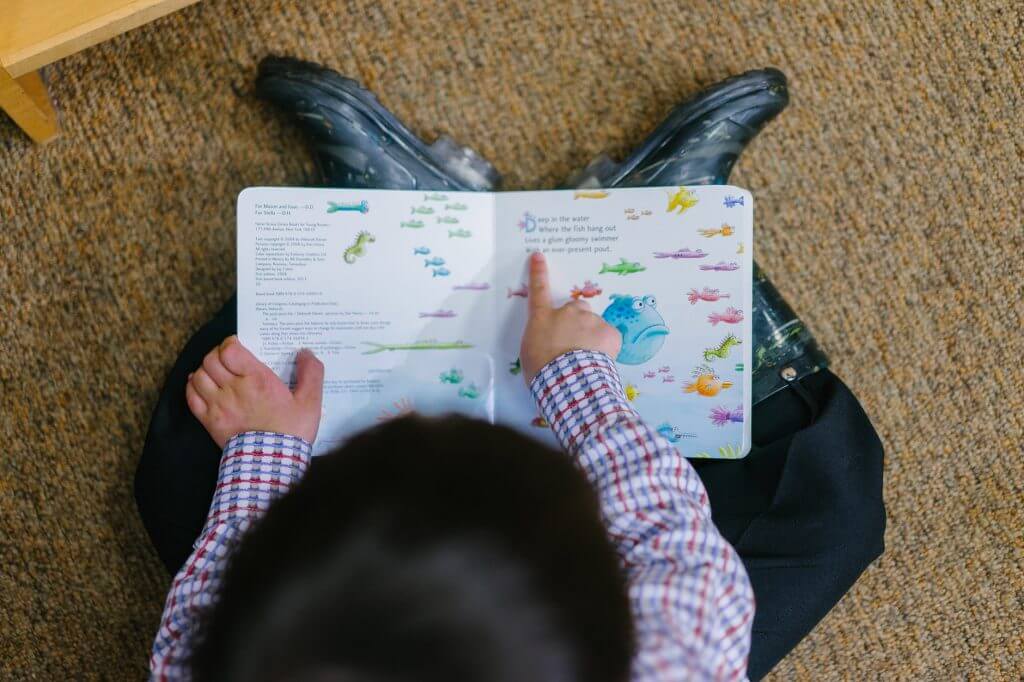
Yeah. Well, it’s not only a safe environment, but it fosters creativity and outside-the-box thinking’s so you can bring that to your role as a marketer or as a sales person or as a writer or whatever your job is.
Yeah, and we were also doing things like using improv to-or think improvises in accordance to real play. We have accelerated to learning so, a real accelerated experience from learning. The real play was like it’s on improv. Instead of doing like a scene play, we call them, it’s like a role play in companies, we would get someone who’s an improviser, and we would do this as well, and we go in and we would act the part of a customer or whatever it was because Bob and Mary from the organization, they didn’t know who we were, and so we would take on the persona, and pretend to be that customer rather than Mary, Bob, and Joe doing it to get to know each other, it’s not as serious. Actually, in some ways, we were using improvises and some ways we were using banks to pretend that we’re robbers, right? So that they’ll go in, and they would really be hamming it up, all sorts of stuff, but they’ll make it real-that’s why it’s called real play. It really showed how people react in those situations because they have to in those banks in those situations. To improvise, they had to be spontaneous to be able to deal with those situations and what was happening there from a creative perspective too, especially in front of the customer’s might of gotten them out of control in the heat of the moment-they have to know what to say and do.
Right, so it gives you a new skill set that you can use to respond in different kinds of situations in a more skilled way.
Yeah.
And the more creative-
Pretty much does. If you can learn to balance that with deep thinking-you’ve got a really good balance. It’s trying to be spontaneous and improvise in situations, but if you, like anything, if that’s all you do then, it’s going to be quite shallow, so you’re also going to balance it off with time to think about some more too, and in work situations or at home or whatever.
Yeah. Very cool! Well, I might just do it! I just might try some improv!
Yeah. You’ll never know what might happen.
Yeah. Very cool! I remember when you were first getting into that and I felt, “Wow, that is so strange!” I mean, what a difference! Going from web design to improv! I wouldn’t have guessed that, but then, you’ve gotten on to this amazing path that improv was the beginning of. It’s very cool!
It comes with the whole thing of, “What you resist, persists.” And all through my life as I was going through school, there is no damn way I was going to get up in front of anyone and speak, right? I think there are statistics that more people would rather die than to get up on stage and talk. By doing improv, and different things happened throughout my life where I got forced in these positions, but actually, doing improv really gave me a lot more confidence to be on stage in front of people, and learn how to interact with the audience and that sort of thing. I think it has so much value and confidence to any person, especially in today’s act of communication where it’s so important in how you can be authentic as well, in your deliverance with people otherwise, like we said earlier, there’s so much things to transcend through, what’s real and what’s not in the group now. We’re all looking for the authentic people.
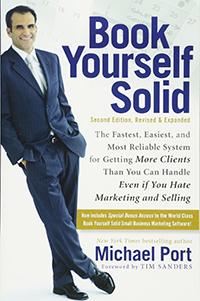
Yup, so authenticity-it’s like the first rule of being an internet marketer, a podcaster, or a writer-if you’re not authentic, people don’t trust you, they don’t like you, they don’t feel any kind of connection with you. Yup, there’s a great interview I did for Get Yourself Optimized with Michael Port, and we went into some public speaking skills, but we didn’t cover improv. I don’t know if you know Michael Port, but he was an actor and he’s got this heroic public speaking course, and Book Yourself Solid is one of his systems-
Yup.
Yup, he was pretty cool! Listeners, be sure to check out that episode too if you’re wanting to improve your speaking skills and take improv.
Yeah, I’ll be looking for that as well and see if I can brush up on a few things myself.
Yeah. He’s good. He’s really good! Yeah, so, if somebody wanted to attend your JOLT challenge-let’s say, the person is in the US-do they have to get on a plane and fly all the way to New Zealand?
That’s right. They do. I don’t know if you’ve heard of Steven Collings?
Yeah. Amazing man!
His son, David, and he’s grandson, Steven, has a business leasing called, and they are currently looking for training providers for us. They’re like our local distributor, and they have gotten us to China so we have a presence soon in Shanghai. We also have a presence in Perth in Australia. We’re New Zealand-based. We are in talking to some people in India as well. If you know someone who’s interested in our program, who maybe wants to license it, it would help because the it’s mainly outside of the states, but we are working towards doing more online things so, be patient-
It’s coming!
We will get there. It’s coming and it will be fantastic. It will be something you will need to do and keep a little tool kit of all your tools you’ve collected. You can purchase the book online at www.jolt.global. We have an e-book as well. Just have a look at our website, and see what you think, if you like it. You can send me an email at st***@**********rs.com. I look forward to hearing from everyone. I’m always open to talking to people or getting people ideas or whatever. I’m a creative-
Yes, you are! One of the best!
I’m open to that so, yeah.
All right, well, thank you, Steve. Thank you, listeners! We’ll catch you on the next episode! This is Stephan Spencer, signing off.
Important Links
Connect with Steve Hill
Organization
Books


